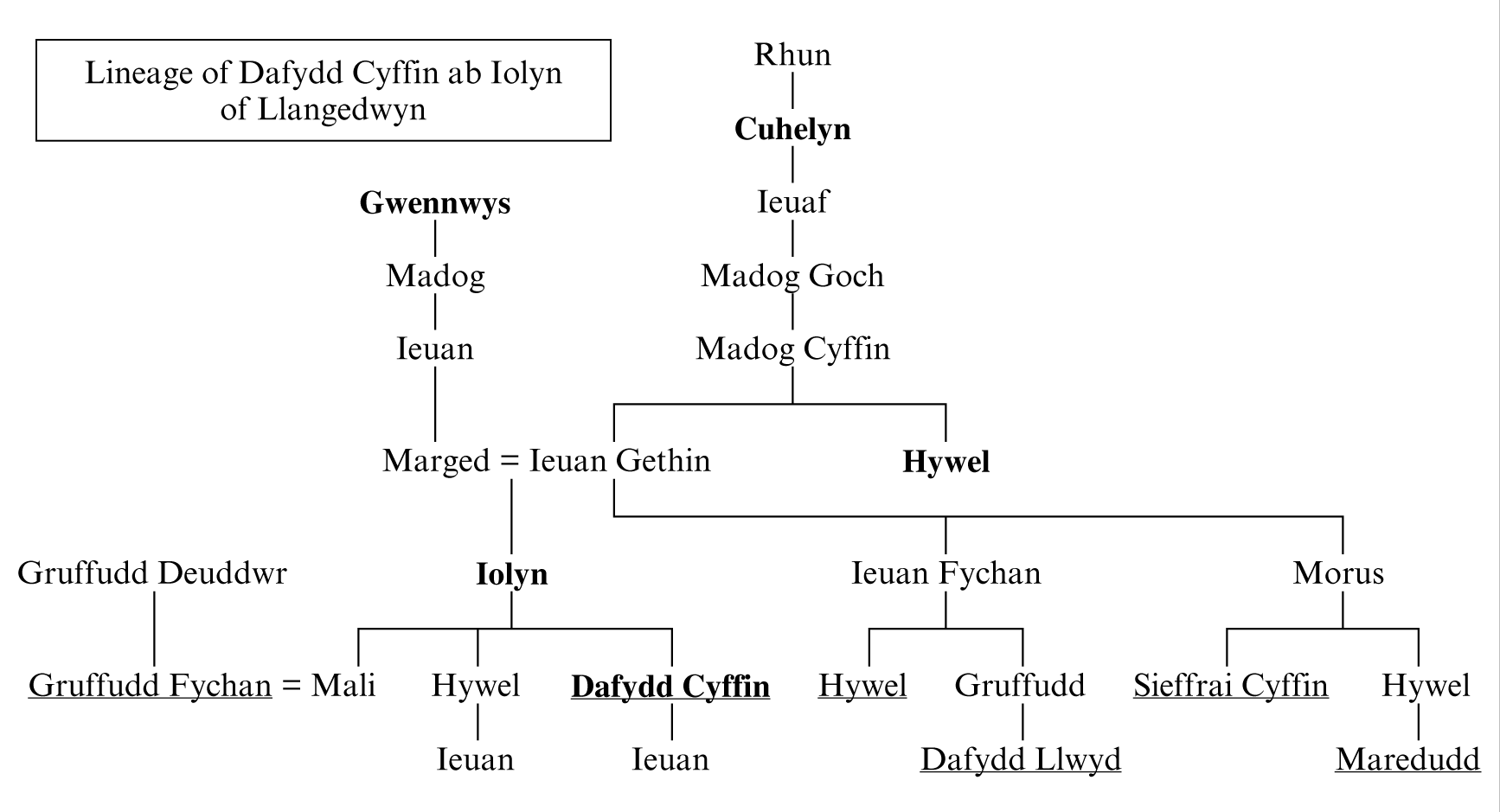Dafydd Cyffin ab Iolyn is the subject of poem 94, a praise poem. The only other poem for him to have survived is a praise poem by Hywel Cilan (GHC poem XVI). However, Guto names him in a poem of praise for Sir Siôn Mechain (84.5–6n), and Hywel Cilan composed a poem of praise for his nephew, Ieuan ap Hywel (GHC poem XVII).
Lineage
The genealogical table below is based on WG1 ‘Bleddyn ap Cynfyn’ 7, 8, 9, 10, 11, ‘Gwenwys’ 1, 2; WG2 ‘Bleddyn ap Cynfyn’ 9D. Those named in Guto’s poem for Dafydd are shown in bold print, and the names of his patrons are underlined.

Lineage of Dafydd Cyffin ab Iolyn of Llangedwyn
As well as Hywel and Mali, Dafydd had other brothers and sisters: Madog, Maredudd, Marged, Mawd, Ieuan and Llywelyn. Dafydd was related to a number of Guto’s patrons. He was a brother-in-law of Gruffudd Fychan of Collfryn and a cousin of both Hywel ab Ieuan Fychan of Moeliwrch and Sieffrai Cyffin of Oswestry. Furthermore, he was a cousin of the fathers of two of Guto’s patrons, namely Gruffudd ab Ieuan Fychan, father of Dafydd Llwyd of Abertanad, and Hywel ap Morus, father of Maredudd ap Hywel of Oswestry. It seems that his mother is not named in the genealogies, nor, indeed, his father’s mother. It is noted that Iolyn was Ieuan Gethin’s son from either his first or his second marriages, both with a woman named Marged daughter of Llywelyn. Nonetheless, Guto describes his patron as Urddol o ganol Gwennwys ‘a dignitary from the tribe of Gwennwys’ (94.45), and no connection can be traced between Dafydd’s lineage and Gwennwys (or Caradog Wennwys) except through Ieuan Gethin’s third wife, Marged daughter of Ieuan. She was Gwennwys’s great-grand-daughter, therefore it is likely that she was also Iolyn’s mother.
His career
Dafydd was a member of a many-branched and influential family in the commote of Cynllaith and the neighbouring commotes of Nanheudwy and Mochnant Is-Rhaeadr, many of them being official administrators in the lordship of Chirk.
It is possible to follow some of the stages of Dafydd’s career, as a result of the work of Huws (2008: 90–3), which is summarized here. He was a student at the University of Oxford, where he had a successful career. He was there by 1444, where he graduated as Bachelor in Canon Law and Civil Law, and on 10 April 1454 he was awarded the degree of Doctor in Canon Law. After returning to Wales he was appointed one of the king’s attorneys in the lordship of Chirk, where he received a commission in July 1461 together with six other men who were also Guto’s patrons, namely Abbot Siôn ap Rhisiart, Rhosier ap Siôn Puleston, Siôn Hanmer, Siôn Trefor, Siôn ap Madog Puleston and Robert ap Hywel (45.49–51n). It appears that he acted as a legal officer to the court of the bishop of St Asaph (94.41n, 42n). As well as being a lawyer, he held the rectorate of the church of Llanrhaeadr-ym-Mochnant, and as the parson of that place he would also have the care of the church of Llangedwyn, one of the chapels of the mother church at Llanrhaeadr. He died before 28 Ebrill 1462, when his successor to the rectorate of the church of Llanrhaeadr-ym-Mochnant, John Segden, was appointed. He can no doubt be seen as an example of that powerful clerical élite possessing an M.A. degree described by Williams (1976: 314) as ‘the aristocracy of graduates, most of them graduates in the faculties of law, who formed the corps of skilled administrators without whose specialized services the work of neither Church nor State could be carried on’.
Bibliography
Huws, B.O. (2008), ‘Dafydd Cyffin (m. 1462): Un o Noddwyr Guto’r Glyn’, LlCy 31: 90–103
Williams, G. (1976), The Welsh Church from Conquest to Reformation (2nd ed., Cardiff)





